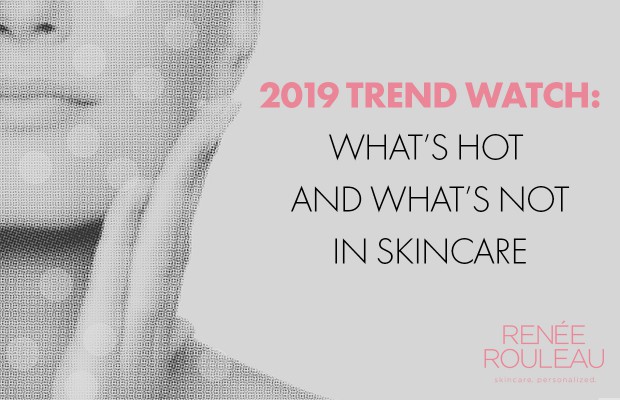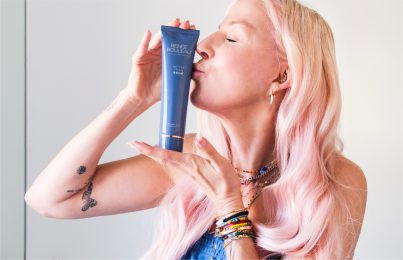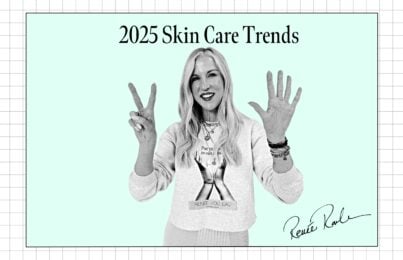For the past 30 years, I’ve seen a lot of things come and go but I think these skincare trends for 2019 and beyond that will be (and need to be) here to stay. (These are in no particular order.)
- Liquid foundation makeup more suitable for acne-prone skin
- Products that offset the aggressiveness of acid exfoliants and retinol
- More products with retinol
- Adult acne products
- CBD-based skincare products
- Vitamins and supplements to support the health of the skin
- Multi-step masking routines
- Airplane travel skincare products
- Artificial colors used in skincare products (and anything else that makes something a good visual for a selfie)
- Transparency of skincare ingredients
- More and more skincare lines
- The 2018 skincare trends that need to go
Liquid foundation makeup more suitable for acne-prone skin
Last year, makeup brands worked harder to include a diverse range of foundations for all skin tones (finally!). In 2019, I think there will be a push to make foundations more suitable for acne-prone skin. Since the current trend in makeup is a moist, dewy look, formulas are being made with heavy ingredients that may cause little bumps (closed comedones) and breakouts on the skin.
Brands through the years have tried to create “oil-free” foundations, but just because it says oil free doesn’t mean that it won’t clog the pores. Isopropyl Myristate, Acetylated Lanolin and D&C Red #30 are three common ingredients that are known to block the pores, and as you can see none of these use the word “oil.”
When anyone gets bumps and breakouts, they will use products to help clear them out (such as products with the ingredient salicylic acid) yet the root cause could very well be their makeup.
I think the trend is that we’re going to see more advancements in brands trying to tackle the issue of having foundations be more skin-friendly and not cause clogged pores and bumps.
And just so you know, pore strips won’t clean your pores—but these three things will.
Products that offset the aggressiveness of acid exfoliants and retinol
People truly want to see results for their skin and two of the best ways to do achieve this is by using products that contain exfoliating acids and collagen-building retinol. They both give immediate and long-term results for smoothing the skin, removing unwanted discoloration, making pores appear smaller, preventing breakouts and giving the skin an overall better look.
However, in the process of improving the skin, acids and retinol are notorious for breaking down the skin’s protective barrier. When going it alone and not being clearly instructed on how to use them properly, they can make your skin get dry and flakey and increase sensitivity. These unwanted side effects are never good for the health and integrity of the skin.
We have so much more awareness of the barrier function of the skin and how to keep it intact so in 2019, more products will have a focus on repairing the skin from overuse of aggressive products. If you suspect you’re over-doing it with your products and are experiencing dryness and irritation, here’s how to fix a damaged moisture barrier.
More products with retinol
In 2018, we certainly saw more and more brands coming out with products that use retinol and in 2019, this will be even stronger. I think what’s going to happen is we’re going to see more categories of products. Typically, it’s been a serum or a cream that has retinol in it. We’ll see brands adding them to masks, eye treatments and I’m sure they’re going to work their way more into hand creams and body lotions.
Retinol (a gentler alternative to using prescription retinoids) have been used for years but similar to using sunscreen and a vitamin C serum, they are now considered to be a staple in a good skincare routine that is focused on healthy aging.
Here are four important things to look for when choosing a retinol product.
Adult acne products
Adult acne is on the rise, especially adult acne for females and using harsh, drying treatments is a no-win situation. Products for acne are usually geared towards teens and are notorious for over-drying the skin and causing flakiness. (See how dry my nephew’s skin is from these types of products.) When you’re an adult, you should be focusing on healthy aging and using harsh products is the last thing you want on your skin.
In 2019, I think there will be more products that target the increase of acne that we’re seeing in adults. These formulas will have a strong antimicrobial, keratolytic and anti-inflammatory effect while being non-drying on the skin.
Read how to prevent adult hormonal breakouts in a gentle way.
CBD-based skincare products
Another one of the skincare trends in 2019 we will see is the use of cannabis as an ingredient. We saw a lot of this already in 2018 but this trend will most certainly continue. As someone who works closely with top chemists in the U.S., they love new toys to play with. They are bored of retinol and all the other tried-and-true ingredients so this new category is quite exciting for them. Whether or not they will be effective or more effective than other current ingredients to improve certain skin conditions remains to be seen as a lot more research needs to be done.
“Whether or not CBD products will be effective or more effective thatn other current ingredients remains to be seen as a lot more research needs to be done.”
Vitamins and supplements to support the health of the skin
One of the skincare trends for 2019 will be more awareness of oral vitamins that may help get you closer to your skincare goals. I believe that supplements and vitamins can play a supporting role in your skin’s health, particularly for those with acne. Read my list of the best supplements and vitamins that may help clear your skin.
Multi-step masking routines
At-home masking has already been a huge trend and this will continue, however, in 2019, I think we’re going to see more multi-step routines when it comes to enhancing the experience.
A lot of people will just cleanse their skin and apply a mask but we know that masks alone can’t be most effective if the skin isn’t prepped properly. Instead of just washing the face and masking, I think we’ll see more prep treatments that will ensure you get maximum benefit from the time you take out of your busy life to do a mask.
Here’s how to give your skin a facial at home.
Airplane travel skincare products
On social media, so many people are promoting their jet-setting lifestyles and sharing their on-flight routines. However, people are still confused on how exactly they need to care for their skin when they know the dry cabin air doesn’t do the skin any favors. (Check out this experiment that proves how dry it is on an airplane.)
I think we’ll see more products coming out that are targeted for lifestyles such as those who are frequent airplane travelers.
Artificial colors used in skincare products (and anything else that makes something a good visual for a selfie)
Nowadays, many skincare companies take a social media-first approach when developing new product formulas. Historically, the focus has always been not about what the product itself looked like but about the product jar or bottle since they want it to stand out on the retail shelves. But now, with more and more people sharing selfies of the actual product on their faces (such as facial masks), brands are now seeing how they can make the actual formula stand out and be picture-worthy. This means adding artificial dyes to products to give a wow effect when it’s on the face. Wearing a clear gel mask doesn’t make it very selfie worthy, right?
Synthetic colorants are not in the best interest of your skin because they can be pore-clogging and irritating and don’t provide any skin benefit. It’s why I have never used any artificial colors in my line. While some of them do have color, it’s from ingredients used that actually help improve the performance, not for their wow effect on social media.
I think artificial colors are going to become more of the norm this year and I just wish it wasn’t that way. To me, what’s in the best interest of your skin should always be the first priority of any skincare formulator.
Transparency of skincare ingredients
Consumers want to know what they are putting on their skin and they have every right to get access to that information. However, some brands are still holding out on disclosing their ingredient lists. Not only are they not listing it on their website but if you email their customer service, they will not share it. Granted, it will always be listed on the product packaging once you receive it, but they just won’t share it digitally.
2019 will be the year where more and more brands will cave in and become more transparent with their customers. A good brand understands that if they don’t give their customers what they are asking for, they will go elsewhere. This includes sharing if the product is vegan, if it uses gluten and if it’s tested on animals.
More and more skincare lines
While we all have our own favorite skincare brands that we like to use, we do love something new and 2019 will be no shortage of newness. What you’ll be seeing is many more new skincare lines coming out—especially from influencers. A big part of this trend is from all the influencers who want to monetize the opportunity of having a following who trust their recommendations.
You will often hear new brand founders say, “I couldn’t find anything out there that worked for my skin so I created it myself.” I don’t buy into that belief at all as there is more than enough out there on the market. Yes, there are certainly innovations in skincare technology like what is going with CBD, but there are way more product lines available than what is able to be innovated behind-the-scenes in the labs. Brands will put a spin on a product to make it sound like they have something that is truly proprietary and that they reinvented the wheel, but that’s mostly marketing talk.
Regardless, new is super fun so I’m excited to see what’s coming out this year. You can read about my personal philosophy about skincare and products.
The 2018 skincare trends that need to go
Liquid exfoliators
While I do love most things with acids, the problem with liquid exfoliating toners is that many of them are recommended for daily use, and I don’t like that at all. I don’t believe that anyone should use a leave-on acid exfoliator every day. It’s for this reason that I think this trend needs to go away. Here’s my review of liquid acid exfoliators.
Sheet masks
While I actually do like a face sheet mask, (my friend Joanna Vargas makes some great ones), I think it’s getting a little carried away as they are now made for every part of the body. What seems to be fueling this trend is how selfie-worthy these are, especially when they have animals and designs printed on them. (What benefit does that give the skin?) There are now butt sheet masks, hair sheet masks, elbow sheet masks, and the list goes on. Sadly, I don’t see the sheet mask trend slowing down.
Micro-needling at home
I have not held back on my opinion about micro-needling dermarollers as well as other home devices. I believe that poking holes in your face is best performed by a professional. You can read my thoughts about dermarollers and other devices.
Celebrity Esthetician & Skincare Expert
As an esthetician trained in cosmetic chemistry, Renée Rouleau has spent 35 years researching skin, educating her audience, and building an award-winning line of products. Her hands-on experience as an esthetician and trusted skin care expert has created a real-world solution — products that are formulated for nine different types of skin so your face will get exactly what it needs to look and feel its best. Trusted by celebrities, editors, bloggers, and skincare obsessives around the globe, her vast real-world knowledge and constant research are why Marie Claire calls her “the most passionate skin practitioner we know.”





